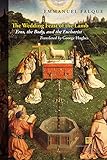The Wedding Feast of the Lamb : Eros, the Body, and the Eucharist / Emmanuel Falque.
Material type: TextSeries: Perspectives in Continental PhilosophyPublisher: New York, NY : Fordham University Press, [2016]Copyright date: ©2016Description: 1 online resource (336 p.)Content type:
TextSeries: Perspectives in Continental PhilosophyPublisher: New York, NY : Fordham University Press, [2016]Copyright date: ©2016Description: 1 online resource (336 p.)Content type: - 9780823270408
- 9780823270439
- online - DeGruyter
- Issued also in print.
| Item type | Current library | Call number | URL | Status | Notes | Barcode | |
|---|---|---|---|---|---|---|---|
 eBook
eBook
|
Biblioteca "Angelicum" Pont. Univ. S.Tommaso d'Aquino Nuvola online | online - DeGruyter (Browse shelf(Opens below)) | Online access | Not for loan (Accesso limitato) | Accesso per gli utenti autorizzati / Access for authorized users | (dgr)9780823270439 |
Browsing Biblioteca "Angelicum" Pont. Univ. S.Tommaso d'Aquino shelves, Shelving location: Nuvola online Close shelf browser (Hides shelf browser)

|

|

|

|

|

|

|
||
| online - DeGruyter Dante and the Dynamics of Textual Exchange : Authorship, Manuscript Culture, and the Making of the 'Vita Nova' / | online - DeGruyter This Distracted Globe : Worldmaking in Early Modern Literature / | online - DeGruyter Upside-Down Gods : Gregory Bateson's World of Difference / | online - DeGruyter The Wedding Feast of the Lamb : Eros, the Body, and the Eucharist / | online - DeGruyter Scatter 1 : The Politics of Politics in Foucault, Heidegger, and Derrida. | online - DeGruyter The Perils of Uglytown : Studies in Structural Misanthropology from Plato to Rembrandt / | online - DeGruyter Ego Sum : Corpus, Anima, Fabula / |
Frontmatter -- Contents -- Translator's note -- Opening -- Preface. The Ghent altarpiece, or, the adoration of the mystic lamb -- Introduction. The swerve of the flesh -- Part I. Descent into the abyss -- 1. Philosophy to its limit -- 2. The staging of the last supper -- 3. Eros Eucharisticized -- Part II. The sojourn of humankind -- 4. The animal that therefore i am -- 5. Return to the organic -- 6. Embrace and differentiation -- Part III. God incorporate -- 7. The passover of animality -- 8. "This is my body" -- 9. Plunging bodily -- Conclusion. The flesh in common -- Notes -- Index
restricted access online access with authorization star
http://purl.org/coar/access_right/c_16ec
Emmanuel Falque's The Wedding Feast of the Lamb represents a turning point in his thought. Here, Falque links philosophy and theology in an original fashion that allows us to see the full effect of theology's "backlash" against philosophy.By attending closely to the incarnation and the eucharist, Falque develops a new concept of the body and of love: By avoiding the common mistake of "angelism"-consciousness without body-Falque considers the depths to which our humanity reflects animality, or body without consciousness. He shows the continued relevance of the question "How can this man give us his flesh to eat?" (John 6:52), especially to philosophy.We need to question the meaning of "this is my body" in "a way that responds to the needs of our time" (Vatican II). Because of the ways that "Hoc est corpus meum" has shaped our culture and our modernity, this is a problem both for religious belief and for culture.
Issued also in print.
Mode of access: Internet via World Wide Web.
In English.
Description based on online resource; title from PDF title page (publisher's Web site, viewed 02. Mrz 2022)


